Bert hamminga Le Penseur Africain
version date 991023 Questions
One of the most difficult things to explain to Westerners is how the African concept
of thinking, the idea of what thinking is, differs from the Western concept. What
follows is an attempt that might seem unconventional but has proven to be most effective
(after actually getting acquainted with an African community and live through actual
thinking experiences with this community).
The primary African "thinking subject" is not an
individual person.
As an African, when I am born, some ancestor has been "born
into" my mother. I will carry his name. I am not this ancestor himself. It is not
"reincarnation". I am the vital power this ancestor is willing to invest
in me. I am a link in the chain of vital power, the chain of procreation of my community.
I pray often to him when I need power. Give us power, I ask him. The living people depend
for their survival on the power of the ancestors. We are nothing but that power. We
are the power to find food, shelter, and partners to procreate. And, the ultimate aim: to
have vitally powerful children, as many as our own vital power allows. These are all
instances of power growth. Vital power is all that matters in life, we care of nothing
else. We understand Darwin very well, and the Old Testament much better than Western
people do. The Old Testament describes our life and most of our consciousness far better
than that of the 20th century Westerner.
Our community is a tree. (Dead) ancestors are roots giving energy to
the trunk, the adults, who in turn supply the branches, leafs and flowers, our children.
The tree knows. "We" know. The tree is the primary thinking subject. Our
way of conveying these messages is not by writing, because we consider writing a
highly ineffective form of communication for our purposes. We use myths, stories and
knowledge available and propagate them in danced and sung music, in story telling,
and by visual methods. Many of these activities and their results are called
"art" in the West, because due to their being victim of writing-[hypostatics##]
few Westerners can comprehend that it really constitutes what in Western terms is best
called science. For instance, the words written thus far lack the sharpness of
the African way to propagate the message in the form of a family tree:
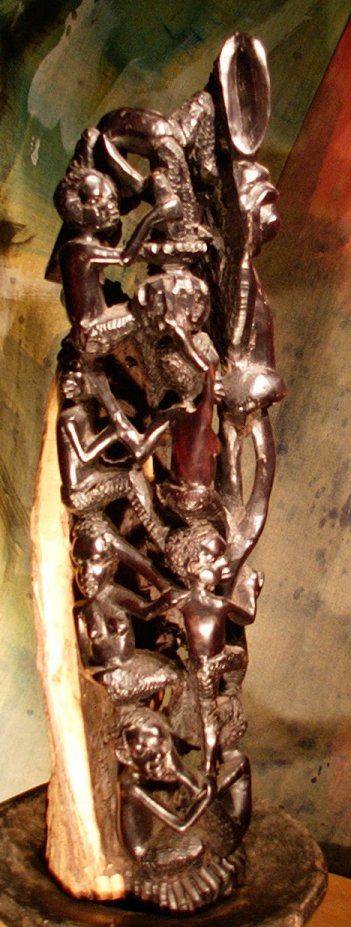 The best way to explain to a Westerner in
the Western way -in words- :what you see on the picture left is to say: this is the
African subject. The tree is the "one who" thinks, knows, works. It
contains many people, dead and alive. Every thought originates from the trunk of the tree,
the (living-)dead. They are the most powerful, thoughtful and knowing, and transfer all
power, thought,and knowledge to the trunk, the adults, who in turn supply the branches,
leafs and flowers, the young and the children. There is no other way to obtain power,
thoughts and knowledge than this.
The best way to explain to a Westerner in
the Western way -in words- :what you see on the picture left is to say: this is the
African subject. The tree is the "one who" thinks, knows, works. It
contains many people, dead and alive. Every thought originates from the trunk of the tree,
the (living-)dead. They are the most powerful, thoughtful and knowing, and transfer all
power, thought,and knowledge to the trunk, the adults, who in turn supply the branches,
leafs and flowers, the young and the children. There is no other way to obtain power,
thoughts and knowledge than this.
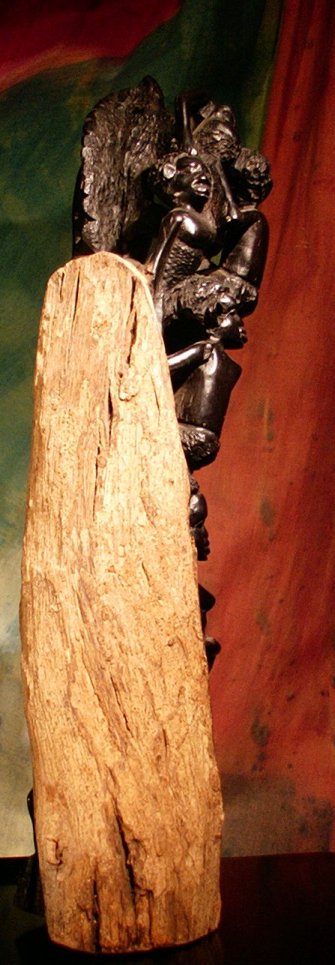 If observed from another angle (right), you
can see that a tree is used for this sculpture deliberately in such a way that its
tree-origin remains visible. What the Westerner should notice in the first place is the
superiority of this picture mode of propagating the thought of subjects as collectives of
people forming trees over the written words above.
If observed from another angle (right), you
can see that a tree is used for this sculpture deliberately in such a way that its
tree-origin remains visible. What the Westerner should notice in the first place is the
superiority of this picture mode of propagating the thought of subjects as collectives of
people forming trees over the written words above.
So, in African culture the vehicles of thought and science are: sounds
and gestures of living people as well as dead ancestors, and shapes and colours in various
media (stone, wood, cloth, ivory etc.). What the propagator of thought does is
representing existing, established thought and science. Representation, in
African phrasing, is the transfer of power of what is to be represented in something
else, thus making this something else a (derived) force in its own right.
The African "representer" (for which the term "artist" is a misleading
translation) does not typically "experiment" or expresses a unique individual
thought, emotion or wisdom. A new thought is impossible, unthinkable in
traditional African culture, a contradictio in terminis, since all thought and
science travels "bottom up" (taken literally) through the family tree, from
living-dead ancestors up to the youngest of generations of a tribal community.
An East Ugandan tribe recently
abandoned its permissiveness in sexual promiscuity facing the AIDS problem. But it was
done only after consulting the ancestors, who did agree with new punishments for
promiscuous sexual contacts previously not considered to be a source of worry. So, the new
rules are thought to constitute a neglected part of the old tribal wisdom that has now to
be put into practice facing the new danger.
Thought formation and communication.
If, therefore, a science is still contested in the tribe there is no expression
of it . Contested thoughts are not expressed: actual thought formation is not the
business of singing, dancing or other visualiziations.
The clan or tribe is the thinking subject. Its thoughts come from the
ancestors. New thoughts are unthinkable (only thinkable are thoughts that
"always" have been "there" may be without part of the community
knowing it). How then does the tribe "doubt"? What if there is a problem of
thought?
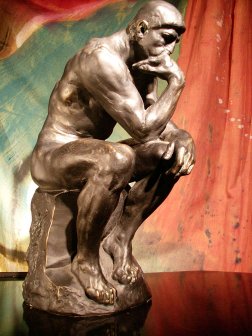 Let us not forget that in the West
eminent people brilliantly expressed this state of mind - the Western version of a problem
of thought- visually. (They are not called scientists but artists, a
distinction that is entirely culture-relative).
Let us not forget that in the West
eminent people brilliantly expressed this state of mind - the Western version of a problem
of thought- visually. (They are not called scientists but artists, a
distinction that is entirely culture-relative).
Western scientists might work for years on the basis of provisional beliefs not shared by
their social and even scientific environment before deciding whether they were wrong or
they should come to the fore with their conclusions inconsistent with general opinion.
That lonely heroism is hailed in the West and striven after by many individuals. , It is
part of the Western appeal of Rodin's "Le Penseur" (left). It is not
at all what Africans cherish. They primarily cherish togetherness: if one sheep
moves, it should come back or the herd should follow. And all this now. What is
expressed in Rodin's "Penseur" is, to African standards, intolerable behaviour.
If there is some doubt about something, there is no bar on proposals by anyone. There is,
if something is under discussion, remarkable freedom of speech for everybody and not any
kind of dictatorship. But someone who is going to sit like Rodin's Penseur will be pulled
off his rock immediately, and on resistance, face the danger of becoming accused of being
possessed by evil forces. Thinking and doubting is considered to be a collective process,
after all, we are one single subject, deriving our common power from common ancestors.
Uganda president Yoweri Museveni, in
his autobiography, explains how he had to learn the use of the commanding type leadership
the hard way: only after serious human losses in the early stage of his liberation
guerilla, he started to cut short unorganized procedures of common decision making among
the fighters. "Originally, the group had been consultative - every decision was
arrived by consensus. But this practice was dangerous when it applied to military
situations" (Museveni, Y.K., Sowing the Mustard Seed London etc: MacMillan
(1997),p.80 ).
In an African collective doubt-resolution procedure, it is not even
sure beforehand who will get his or her way. That might depend on the subject. Different
group members have different expertise, hence different persuasive power in different
situations of doubt. It is the elders how take the lead directing the attention to voices
most likely to transfer the best of the expertise available, that is, voices that have, in
African phrasing, most power. Whoever gets his or her way, we shall have to
settle the thing now. After settling, you accommodate. African communities have a
wide range of methods to make voices heard and streamlining them towards a consensus.
Africans are astonishingly obedient in following the outcome of a procedure, even if it
runs counter the opinion they defended and their interest in the affair at stake.
These opinions and special interests are readily sacrificed for the higher aim of togetherness.
and it is this ultimate aim of togetherness that is the exact opposite of
what Rodin's Penseur radiates.
Now this settling in the group looks, to Westerners, most like the way
Westerners settle things individually, as heroically expressed by Rodin: Westerners
usually buy the metaphor of doubt that one voice in you tells you to go somewhere, another
to go elsewhere. That is a way to say you hesitate. It is an uncomfortable state of mind.
If in an African group there are inconsistent proposals, the group as a togetherness
is in quite a similar uncomfortable state of mind. The state has to be resolved quickly.
It decreases vitality, it inhibits action. Westerners do not have objections to the
internal conflict of doubting as such, but, apart from may be some philosophers, they do
not want it to last for long. A Westerner who keeps hearing conflicting voices goes in
therapy. In the African group, one feels the same, though not about oneself as an
individual but about the community. They do not need therapy, they are well
trained and equipped with procedures to reach community-wide consensus.
The African "palaver" is a
well known example of coming together and reaching agreement. On disagreement between
individuals or groups, elders are sought, preferably common grand-elders and
great-grandelders, if this is impossible, one brings together grandelders and great
grandelders that are close relatives. They hear parties seperately, and together, and try
to reach some consensus. If this fails they consult the ancestors and issue a
solution of the problem by way of tribal verdict (usually involving the obligation to some
party to apologize and present certain kinds of gifts) to which non compliance is thought
absolutely impossible.
The term "voice" in the sense just used is a beautiful
instrument to say what a "person" is in classical Africa: a person is voice
in the tribe. Everybody is a voice in the tribe. In most public events, sung
and clapped refrains by everybody are alternated by persons coming to the middle and
performing song and dance, watched by everybody. And everybody will have his or her turn.
Almost as soon as you can walk, you will participate, and you will keep doing so often
even well after you lost your ability to stand. It is the most important African way to
represent, affirm and propagate established thought and science. This rhythmic and social
(not the harmonic) tradition where everybody has his share came to the West with jazz,
quickly degrading from African collective science in personal lamentations
(blues) and then pithily perverted in its recent Western academic degeneration to
"art" (jazz musicians learning to read!!!) and perverted most of all in that
vital insult to the drum, the fake 19th century Western romanticism of the pop
music of the last half century.
This unconditional individual(!!) acceptance by the group has the
astonishing effect often observed by those Westerners who did some teaching in Africa: ask
a student to lecture on a subject in the class next time and he or she will tell a
coherent story, by heart, or with only a few words on a tiny paper. No shyness, no groping
for sentences. They give themselves, because they did not learn to fear as students learnt
in the West.
To the African it seems difficult to be an individual in the West
because in Western society they do not see a group to be an individual in. And that is why
to the African Westerners seem to be a mass, a mob. Westerners look like each other: they
wear similar clothes, although different every new season (while the old ones were still
perfect), they have the same opinions, the same interests, they watch the same TV
programmes. There is a fixed set of commodities a Westerner needs to possess in order to
take part in normal social intercourse. There is competition in having it a little bigger,
a little shinier than your neighbour. To obtain these commodities, Westerners neglect the
care and extension of their families in favour of money earning activities. To Africans,
the mass of Westerners seems to consist of very similar "individuals", a
homogenous sea to drown in.
Although Westerns cherish individuality and Africans hail group
conformity, the resulting picture is not simple. Many advertising are decisively
Western in creating lots of associations with "individuality", but the result is
an extreme conformity of larger masses of consumers of the very same product! Because due
to freedom of individual choice exit and entry to different Western "groups" is
easy (fan clubs, schools, options-exchange brokers, and many other kinds of
"scenes"), the way to become part of such a group is to conform meticulously to
habits of dressing, accessories like types of cars and scene-specific codes of behaviour.
Due to basic individuality Westerners have to "work" for membership of
some group. Africans do not need to do anything to be member of their family, clan and
tribe. As a result, Africans are remarkably free in other respects like dressing,
behaving, and choice between protestant, catholic or Muslim religion. The obvious and
unassailable group membership of the African yields options for individualism unreachable
for Westerners.
Westerners can be surprised to see us all getting gay if some of us get
gay, to see us all becoming sad if some of us get sad. That is because we are one body, a
tree. We sing, we dance, we weep, we think. We are "together", in a so
far reaching meaning of that word that Westerners will have a hard time understanding and
believing this togetherness. Ironically, the West sent christians to us to teach us about
togetherness. But we are the experts. thinking is one form of togetherness.
The African view on Western thought.
If you ask Africans familiar with Western philosophy and science what
they would primarily say about it in case they would have to explain it to fellow
Africans unfamiliar with the subject, often the answer is: "It's critical".
Now what does that mean if one African says that to another African in explaining the
Western idea of philosophy as well as science? The listening African is asked by the
explaining African to make the following steps. First consider yourself as an
"independent", "isolated" individual. Second, build up your own private
set of "reasons to believe". Third, on every occasion you have to decide whether
to believe something or not, you should come, individually, on your own, to your own
conclusions, using your own set of reasons to believe, if necessary expanding them for the
purpose.
Westerners who are best in understanding the reverse leap
are those who have to cooperate closely and on a nearby instinctive level with others. I
know it of participants of team sports at high level, and of improvised music. I remember
the comment by an Ajax player on a goal: "Yes, it went perfect, we did not think, we
just did it". Similar experiences can be heard in improvised music: musicians say
that at their best moments they "dissolve into" their own music, they do not at
that moment feel they consciously decide for some playing strategy, it just
"happens" to them together
.
This might strike Westerners as an underestimation of the social aspect
of Western thought and belief formation. But from the African distance, it is not far
besides the point. Anyway, it stresses the scary leaps to loneliness Africans have to make
if they wish to understand Western belief formation, whether in philosophy or in science
(and for Westerners the reverse leaps, the subject of this paper, are even more difficult
to make). Among early modern Western hero's of thought and science, there is a strikingly
frequent occurrence of independent minds that went their own individual, often lonely way,
frequently laughed at, punished or even burned by their tribesmen. Africans ready to make
such a choice for a dangerous solo tour through life are even scarcer than there were in
the early modern Western period, though they are now growing in number. Their courage
should make everybody stand in awe. A part of a tree does not choose an individual
existence. No part of a body, and by "body" the tribe is meant to which you
belong, can meaningfully survive cut off from the rest. And everything you do, including
acquisition of knowledge and coming to beliefs, serves the purpose of enhancing the vital
energy, the procreation of the tribe. Together. What the soloist does is worse than dying:
he will never be a root.
Lusoga proverb: Omwâná wa mwíno:
tákúmála bugúmbá: The child of your sister (friend) can't take away your barrenness.
(proverb 848 in Ensambo edh' Abasoga, Cultural Research Centre) and passim
proverbs on "bachelors"
In what sense the African force of thought appears to be
stronger than of the West
The difference between the individual thinking hero that constitutes a
Western ideal with the representation of thought in African culture is best displayed not
in the Western way, by writing words, but in the African way, by contrasting the lonely
and suffering Penseur by Rodin with the vital energy radiated by the family tree.
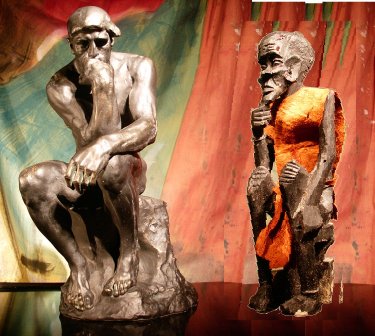 However even if we put together a statue of
an African elder, as such considered to be one of the highest, hence most powerful, hence
most respected, living thinkers, generally called Musé in Uganda, with Rodin's
penseur, the real proportions become clear at sight: it immediately transpires that both
are thinking about the the problems of....the Western lonely hero. That is because Musé
so markedly, so unlike Rodin's Penseur radiates togetherness in his
thinking. That radiation of togetherness in thinking of Musé himself is what is
the representer wants the beholder to learn, the fact that this power of radiation
transcended to the wooden object illustrates the the force and maturity of African
expression. It stems from it being recognized as what in the Western phrasing should be
called science (not "art"). It is not probing, it is representing
established thought, in its full force of being established: old people are powerful,
wise, they are the foundation of tribal civilization, their thought is not experimental,
and not merely about themselves but about all problems that may arise in the
community. Another important thing to note is that African wisdom is, contrary to Rodin's
thinking, not muscular, though Africans understand very well the meaning and necessity of
muscles.
However even if we put together a statue of
an African elder, as such considered to be one of the highest, hence most powerful, hence
most respected, living thinkers, generally called Musé in Uganda, with Rodin's
penseur, the real proportions become clear at sight: it immediately transpires that both
are thinking about the the problems of....the Western lonely hero. That is because Musé
so markedly, so unlike Rodin's Penseur radiates togetherness in his
thinking. That radiation of togetherness in thinking of Musé himself is what is
the representer wants the beholder to learn, the fact that this power of radiation
transcended to the wooden object illustrates the the force and maturity of African
expression. It stems from it being recognized as what in the Western phrasing should be
called science (not "art"). It is not probing, it is representing
established thought, in its full force of being established: old people are powerful,
wise, they are the foundation of tribal civilization, their thought is not experimental,
and not merely about themselves but about all problems that may arise in the
community. Another important thing to note is that African wisdom is, contrary to Rodin's
thinking, not muscular, though Africans understand very well the meaning and necessity of
muscles.
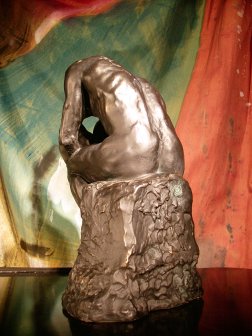 Rationalism
and empiricism
Rationalism
and empiricism
Le Penseur, a popular image often used in philosophy books, announcements for
conferences etc. depicts the Western rationalist in the technical philosophical
sense: one who attempts to capture knowledge by pure thought, reasoning to
the essence. While thinking, he supports his right elbow with left knee and bends his
back forward in torsion, a position emphatically dissuaded by physiotherapists because it
tends to lead to back injuries (see picture left).
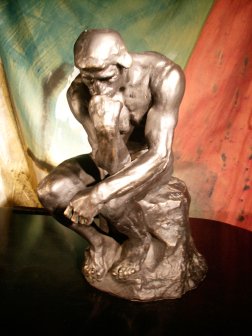 Western empiricists,
who seek to acquire knowledge through observation, would not be charmed by the
way Le Penseur seems to have closed himself off from sense experiences (see right). The
Western empiricist is looking around like the African family tree does (see
pictures above), but unlike the African family tree has no objections at all in
doing so on his own, as in individual activity.
Western empiricists,
who seek to acquire knowledge through observation, would not be charmed by the
way Le Penseur seems to have closed himself off from sense experiences (see right). The
Western empiricist is looking around like the African family tree does (see
pictures above), but unlike the African family tree has no objections at all in
doing so on his own, as in individual activity.
Whether someone is a rationalist or an empiricist can usually best be judged looking at
the eyes and posture.
 Left is Pierre
Gassendi, one of the founding fathers of modern empiricism. Look how his eyes look at you.
Left is Pierre
Gassendi, one of the founding fathers of modern empiricism. Look how his eyes look at you.
 Right: Thomas Hobbes,
an early modern empiricist. He once was criticised for not having read some book and
replied: "Sir, would I have read as much as you, I would have known as little".
Right: Thomas Hobbes,
an early modern empiricist. He once was criticised for not having read some book and
replied: "Sir, would I have read as much as you, I would have known as little".
 Left: David Hume, another
founder of empiricism. Standing very well upright, open to see who is looking at him. His
posture does not make him prone to back problems.
Left: David Hume, another
founder of empiricism. Standing very well upright, open to see who is looking at him. His
posture does not make him prone to back problems.
 Left: Thales of
Milete, an ancient Greek philosopher had, if we should trust the sculpture, the most
hawkish eyes of all empiricists. He taught that everything is evolving, nothing stays as
it is. But, you can see from his face, this did not discourage him to keep trying to
follow as long as possible some things evolving in the world. This is the philosopher
whose stature will certainly have most approval from physiotherapists, though all
empiricists above are standing well upright with a well stretched spinal column.
Left: Thales of
Milete, an ancient Greek philosopher had, if we should trust the sculpture, the most
hawkish eyes of all empiricists. He taught that everything is evolving, nothing stays as
it is. But, you can see from his face, this did not discourage him to keep trying to
follow as long as possible some things evolving in the world. This is the philosopher
whose stature will certainly have most approval from physiotherapists, though all
empiricists above are standing well upright with a well stretched spinal column.
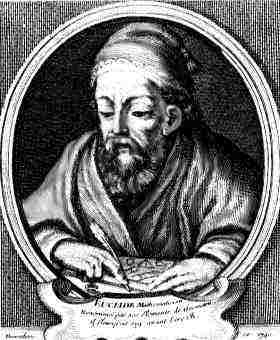 Right: Euclid, the
inventor of the axiomatic method of geometry. He is depicted as concentrated on what he is
writing on a paper. He is in his thoughts. We, seeing him, clearly feel we should not
disturb him. He is most like Rodin's Penseur. Though not sitting badly from a
physiotherapist's point of view (his table has the correct height, able to support the
elbows, and his head is not too far down), he would certainly be advised not to sit like
this for a long time and do some stretching exercises after a longer session. Euclid has
been a paradigm example for all famous rationalist philosophers of modern times.
Right: Euclid, the
inventor of the axiomatic method of geometry. He is depicted as concentrated on what he is
writing on a paper. He is in his thoughts. We, seeing him, clearly feel we should not
disturb him. He is most like Rodin's Penseur. Though not sitting badly from a
physiotherapist's point of view (his table has the correct height, able to support the
elbows, and his head is not too far down), he would certainly be advised not to sit like
this for a long time and do some stretching exercises after a longer session. Euclid has
been a paradigm example for all famous rationalist philosophers of modern times.
Mathematics, Euclid's basic trade, has naturally been the paradigm science for
rationalism: its truth does not depend on obervation.
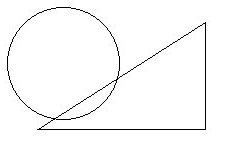 It may seem that
mathematical objects like circles and traingles can be "seen" on a drawing like
the left picture. But that is false: if you look carefully enough, you will discover
errors in the drawing. You cannot draw a real, perfect circle. The perfect circle
is an idea. Since mathematics, by working with such ideas comes to conclusions
that are sure and neat, many philosophers held that the mathematical method of deducing
from principles is the proper one for acquiring any type of knowledge, not only
about geometric figures and numbers, but also of stars, animals and economic households
etc.. Plato, for instance, held that real horses running around on our globe are imperfect
models of the idea of a horse that constitutes all real truth about horses, just as it is
with mathematical circles.
It may seem that
mathematical objects like circles and traingles can be "seen" on a drawing like
the left picture. But that is false: if you look carefully enough, you will discover
errors in the drawing. You cannot draw a real, perfect circle. The perfect circle
is an idea. Since mathematics, by working with such ideas comes to conclusions
that are sure and neat, many philosophers held that the mathematical method of deducing
from principles is the proper one for acquiring any type of knowledge, not only
about geometric figures and numbers, but also of stars, animals and economic households
etc.. Plato, for instance, held that real horses running around on our globe are imperfect
models of the idea of a horse that constitutes all real truth about horses, just as it is
with mathematical circles.
Empiricist hold that many types of knowledge are unlike pure mathematical knowledge in
being established not with full certainty and only by means of reference to things people
have observed: all planets move in ellipse shaped orbits, animals cannot live at
temperatures higher than 62o C, households procure needs by labour. You can't prove
such things, nevertheless you can be justified in believing they are true.
Famous rationalists thought they had
proven the "necessity" of things that were later observed to be
false: Immanuel Kant (1724-1804) for instance thought he had proven that the universe is
Euclidian, which it turned out not to be. Gottlieb Friedrich Wilhelm Hegel (1770-1831),
thought he had proven there could be only seven planets orbiting around the sun (and the
"proof" was the most interesting part, because everybody at the time believed
they were 7), while the list now shows a lot more.
Some empiricists believe even math
should be observed to be true: if you do not believe 2+2=4, just add apples,
coin, matches. You will get tired and really start to believe 2+2=4. Actually: children
first learn to count 1,2,3,4 using things like fingers, apples and pieces of chocolate.
Then, they are taught to merge two sets of 2 and recount. So experience does play
a role in learning! But of course, if once the result would be 5, this would not
prompt mathematical research. I myself misunderstood the nature of mathematics when as a
12 year old I did my first mathematics homework: I was given two angles of a triangle, and
asked for the third. Of course I was supposed to use the recently taught theorem that the
the angles of a triangle always add up to 180o, but I came to school with
measurement results that, though quite accurate, did have a few degrees deviation!
The dispute between rationalism and empiricism is now solved (except in some quarters
of philosophical die-hards): there is a very clear distinction between formal sciences
like mathematics, and empirical science like physics and economics. A lot of formal
scientic work is done in empirical sciences, because theories of empirical science are
often about values of measurement results. These are numbers, and models explaining what
combinations of numbers one should expect are, naturally, mathematical models.
What is best to spread science, images or words?
If you download this particular web page, the total kilobyte size of text does not even
completely equal that of one image. More than 90% of the kilobyte information of this
particular web page is imagery.
What does that mean? Does it mean that the reader should spend 90% of his absorbing time
of this page to the images?
Not necessarily. May be more, may be less. Images carry with themselves
relatively much of the information you need to understand them. Words are carrying only
what is strictly necessary for the intended receiver to trigger
complicated language software resident in his brains that co-operates with the
text sent to create "understanding". You can show the family tree and Le Penseur
to a little child and it will understand that people are climbing on top of each other and
looking out, and there is a man who should not be disturbed. But the text of this
web page will only be readable when the child is 10, and only be satisfactorily
understandable when it is 16. Only at that age the child will have managed to load the
relevant language software in its brain .
"Language" should not be taken narrowly. To
understand words like "science", "knowledge" and
"understanding" you need vital pop up's in world understanding as well!.
But the importance of imagery and interaction in acquiring science is well
illustrated with this example: suppose you buy a new type of complicated machine (say a
DVD player and recorder). You do not know how to operate it. It has a manual. But your
neighbour bought the same thing last month and spent a weekend going through it. How much
time would the neighbour need to teach you all that he learned in that weekend? Indeed,
many readers will have had experiences leading to estimates between 30 and 45
minutes!
Among philosophers, written language is a venerated vehicle for inter human transmission.
The DVD player and recorder example shows that written language actually is a clumsy and
unnecessary time consuming instrument that often leads you astray. In philosophy, people
thus led astray write books read by people who are thus led astray and start to write more
books, because in philosophy there is no criterion like a DVD player and recorder that
should be operated properly.
Go to: Questions about Le Penseur
For more about these issues click
here
 The best way to explain to a Westerner in
the Western way -in words- :what you see on the picture left is to say: this is the
African subject. The tree is the "one who" thinks, knows, works. It
contains many people, dead and alive. Every thought originates from the trunk of the tree,
the (living-)dead. They are the most powerful, thoughtful and knowing, and transfer all
power, thought,and knowledge to the trunk, the adults, who in turn supply the branches,
leafs and flowers, the young and the children. There is no other way to obtain power,
thoughts and knowledge than this.
The best way to explain to a Westerner in
the Western way -in words- :what you see on the picture left is to say: this is the
African subject. The tree is the "one who" thinks, knows, works. It
contains many people, dead and alive. Every thought originates from the trunk of the tree,
the (living-)dead. They are the most powerful, thoughtful and knowing, and transfer all
power, thought,and knowledge to the trunk, the adults, who in turn supply the branches,
leafs and flowers, the young and the children. There is no other way to obtain power,
thoughts and knowledge than this.  If observed from another angle (right), you
can see that a tree is used for this sculpture deliberately in such a way that its
tree-origin remains visible. What the Westerner should notice in the first place is the
superiority of this picture mode of propagating the thought of subjects as collectives of
people forming trees over the written words above.
If observed from another angle (right), you
can see that a tree is used for this sculpture deliberately in such a way that its
tree-origin remains visible. What the Westerner should notice in the first place is the
superiority of this picture mode of propagating the thought of subjects as collectives of
people forming trees over the written words above.  Let us not forget that in the West
eminent people brilliantly expressed this state of mind - the Western version of a problem
of thought- visually. (They are not called scientists but artists, a
distinction that is entirely culture-relative).
Let us not forget that in the West
eminent people brilliantly expressed this state of mind - the Western version of a problem
of thought- visually. (They are not called scientists but artists, a
distinction that is entirely culture-relative). However even if we put together a statue of
an African elder, as such considered to be one of the highest, hence most powerful, hence
most respected, living thinkers, generally called Musé in Uganda, with Rodin's
penseur, the real proportions become clear at sight: it immediately transpires that both
are thinking about the the problems of....the Western lonely hero. That is because Musé
so markedly, so unlike Rodin's Penseur radiates togetherness in his
thinking. That radiation of togetherness in thinking of Musé himself is what is
the representer wants the beholder to learn, the fact that this power of radiation
transcended to the wooden object illustrates the the force and maturity of African
expression. It stems from it being recognized as what in the Western phrasing should be
called science (not "art"). It is not probing, it is representing
established thought, in its full force of being established: old people are powerful,
wise, they are the foundation of tribal civilization, their thought is not experimental,
and not merely about themselves but about all problems that may arise in the
community. Another important thing to note is that African wisdom is, contrary to Rodin's
thinking, not muscular, though Africans understand very well the meaning and necessity of
muscles.
However even if we put together a statue of
an African elder, as such considered to be one of the highest, hence most powerful, hence
most respected, living thinkers, generally called Musé in Uganda, with Rodin's
penseur, the real proportions become clear at sight: it immediately transpires that both
are thinking about the the problems of....the Western lonely hero. That is because Musé
so markedly, so unlike Rodin's Penseur radiates togetherness in his
thinking. That radiation of togetherness in thinking of Musé himself is what is
the representer wants the beholder to learn, the fact that this power of radiation
transcended to the wooden object illustrates the the force and maturity of African
expression. It stems from it being recognized as what in the Western phrasing should be
called science (not "art"). It is not probing, it is representing
established thought, in its full force of being established: old people are powerful,
wise, they are the foundation of tribal civilization, their thought is not experimental,
and not merely about themselves but about all problems that may arise in the
community. Another important thing to note is that African wisdom is, contrary to Rodin's
thinking, not muscular, though Africans understand very well the meaning and necessity of
muscles. Rationalism
and empiricism
Rationalism
and empiricism Western empiricists,
who seek to acquire knowledge through observation, would not be charmed by the
way Le Penseur seems to have closed himself off from sense experiences (see right). The
Western empiricist is looking around like the African family tree does (see
pictures above), but unlike the African family tree has no objections at all in
doing so on his own, as in individual activity.
Western empiricists,
who seek to acquire knowledge through observation, would not be charmed by the
way Le Penseur seems to have closed himself off from sense experiences (see right). The
Western empiricist is looking around like the African family tree does (see
pictures above), but unlike the African family tree has no objections at all in
doing so on his own, as in individual activity.  Left is Pierre
Gassendi, one of the founding fathers of modern empiricism. Look how his eyes look at you.
Left is Pierre
Gassendi, one of the founding fathers of modern empiricism. Look how his eyes look at you. Right: Thomas Hobbes,
an early modern empiricist. He once was criticised for not having read some book and
replied: "Sir, would I have read as much as you, I would have known as little".
Right: Thomas Hobbes,
an early modern empiricist. He once was criticised for not having read some book and
replied: "Sir, would I have read as much as you, I would have known as little". Left: David Hume, another
founder of empiricism. Standing very well upright, open to see who is looking at him. His
posture does not make him prone to back problems.
Left: David Hume, another
founder of empiricism. Standing very well upright, open to see who is looking at him. His
posture does not make him prone to back problems. Left: Thales of
Milete, an ancient Greek philosopher had, if we should trust the sculpture, the most
hawkish eyes of all empiricists. He taught that everything is evolving, nothing stays as
it is. But, you can see from his face, this did not discourage him to keep trying to
follow as long as possible some things evolving in the world. This is the philosopher
whose stature will certainly have most approval from physiotherapists, though all
empiricists above are standing well upright with a well stretched spinal column.
Left: Thales of
Milete, an ancient Greek philosopher had, if we should trust the sculpture, the most
hawkish eyes of all empiricists. He taught that everything is evolving, nothing stays as
it is. But, you can see from his face, this did not discourage him to keep trying to
follow as long as possible some things evolving in the world. This is the philosopher
whose stature will certainly have most approval from physiotherapists, though all
empiricists above are standing well upright with a well stretched spinal column.  Right: Euclid, the
inventor of the axiomatic method of geometry. He is depicted as concentrated on what he is
writing on a paper. He is in his thoughts. We, seeing him, clearly feel we should not
disturb him. He is most like Rodin's Penseur. Though not sitting badly from a
physiotherapist's point of view (his table has the correct height, able to support the
elbows, and his head is not too far down), he would certainly be advised not to sit like
this for a long time and do some stretching exercises after a longer session. Euclid has
been a paradigm example for all famous rationalist philosophers of modern times.
Right: Euclid, the
inventor of the axiomatic method of geometry. He is depicted as concentrated on what he is
writing on a paper. He is in his thoughts. We, seeing him, clearly feel we should not
disturb him. He is most like Rodin's Penseur. Though not sitting badly from a
physiotherapist's point of view (his table has the correct height, able to support the
elbows, and his head is not too far down), he would certainly be advised not to sit like
this for a long time and do some stretching exercises after a longer session. Euclid has
been a paradigm example for all famous rationalist philosophers of modern times.  It may seem that
mathematical objects like circles and traingles can be "seen" on a drawing like
the left picture. But that is false: if you look carefully enough, you will discover
errors in the drawing. You cannot draw a real, perfect circle. The perfect circle
is an idea. Since mathematics, by working with such ideas comes to conclusions
that are sure and neat, many philosophers held that the mathematical method of deducing
from principles is the proper one for acquiring any type of knowledge, not only
about geometric figures and numbers, but also of stars, animals and economic households
etc.. Plato, for instance, held that real horses running around on our globe are imperfect
models of the idea of a horse that constitutes all real truth about horses, just as it is
with mathematical circles.
It may seem that
mathematical objects like circles and traingles can be "seen" on a drawing like
the left picture. But that is false: if you look carefully enough, you will discover
errors in the drawing. You cannot draw a real, perfect circle. The perfect circle
is an idea. Since mathematics, by working with such ideas comes to conclusions
that are sure and neat, many philosophers held that the mathematical method of deducing
from principles is the proper one for acquiring any type of knowledge, not only
about geometric figures and numbers, but also of stars, animals and economic households
etc.. Plato, for instance, held that real horses running around on our globe are imperfect
models of the idea of a horse that constitutes all real truth about horses, just as it is
with mathematical circles.